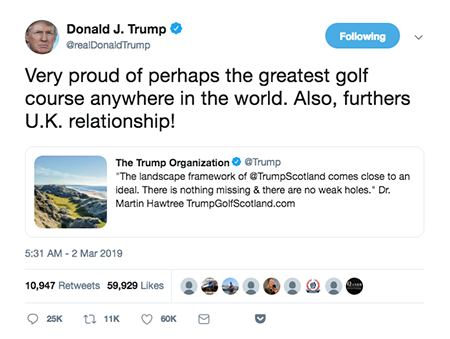The Emoluments Clause
What is an Emolument?
Simplest answer: presents. Gifts. Swag. Benefits. But more specifically, presents given to get favors in return. And in the constitution it means presents given to government officials by foreign governments, whether they’re trying to get in good with a diplomat or they just think you needed a jewel-encrusted snuff box to complete your decor.
The Constitution says:
Article I, Section 9, Clause 8 (Foreign Emoluments Clause or Title of Nobility Clause):
No Title of Nobility shall be granted by the United States: And no Person holding any Office of Profit or Trust under them, shall, without the Consent of the Congress, accept of any present, Emolument, Office, or Title, of any kind whatever, from any King, Prince, or foreign State.
Article II, Section 1, Clause 7 (Domestic Emoluments Clause or Presidential Emoluments Clause):
The President shall, at stated Times, receive for his Services, a Compensation, which shall neither be increased nor diminished during the Period for which he shall have been elected, and he shall not receive within that Period any other Emolument from the United States, or any of them.
So basically,
To avoid foreign governments from influencing American government officials, it was written into the constitution that they’re not allowed to take gifts, be knighted, bequeathed a dukedom, or covertly slipped envelopes of cash. Because then they might make decisions in the interest of that foreign government, or even for themselves in hopes for more free stuff, rather than in the best interest of the American people. Basically, it’s the “don’t get bribed” clause.
And for the entire history of the United States until now, Presidents have been really careful to make sure they don’t break this clause. They’re allowed to take gifts of a “minimal value” (a few hundred dollars) but anything bigger, accepted to “avoid embarrassment to either party,” Congress votes if the President can keep it, or if it gets sold and the money goes into the Treasury, or if it gets sent to the National Archives. This applied first to foreign officials, but it has come up with Presidents too because foreign governments love offering gifts, and suspiciously often, giving them herds of animals.
Sorry, King of Siam, I’m just not sure elephants would like it here. Plus, we just destroyed like a million bison. -Abraham Lincoln
Plus, the founding fathers were really sensitive about the whole monarchy thing, so they weren’t stoked about anyone in the government being called “His Highness.”
What’s the big deal?
In 2016, we elected a guy with business dealings in other countries, and turns out he might have some conflicts of interest. Is he going to veto sanctions against countries he’s trying to build in? Are foreign officials going to stay at his hotel in Washington D.C. in hopes he is more favorable to them? Are Saudi royals going to rent apartments in Trump Tower to give him money? What if a bank owned by the government of China leases office space in his building? Or the Kuwaiti Embassy changes its gala from the Four Seasons to the Trump Hotel when he got elected?
Yeah all of that already happened.
So constitutional scholars get a little cringe-y when the President tweets something like this:
There are some people who say the emoluments clause doesn’t apply to the president, only foreign officials. There are also arguments that it only applies to outright gifts, not payment for services rendered, like hotel stays. And not all conflicts of interest are emoluments violations, and some aren’t illegal, even if they’re unethical.
The foreign emoluments clause has no case law to draw from, and the domestic one hasn’t even been discussed since it was written it seems. Nonetheless, Jimmy Carter placed his peanut farm in a blind trust during his presidency, and Barack Obama deposited a pair of velvet flip flops from the government of Myanmar with the National Archives. But hey, George Washington sold the best flour in town and John Jay kept a horse from the King of Spain, so that’s precedent, right?
Sources
- What Is an Emolument? Donald Trump Has People Talking About This Part of the Constitution (Time, November 22, 2016)
- What is the ‘Emoluments Clause’? Does it apply to President Trump? (Washington Post, January 23, 2017)
- Do President Trump’s business conflicts violate the Constitution? (Washington Post, February 24, 2017)
- ‘Emoluments’ Challenge to Donald Trump’s Ethics Conflicts Gets a Big Boost (Huffington Post, April 18, 2017)
- Trump’s Biggest Potential Conflict of Interest is Hiding in Plain Sight (Forbes, February 28, 2018)
- D.C. and Maryland AGs: Trump ‘flagrantly violating’ emoluments clause (Washington Post, June 12, 2017)
- How Does Trump’s Immigration Freeze Square With His Business Interests? (NPR, January 28, 2017)
- Why the emoluments clause will not end Trump’s presidency (NBC News, January 7, 2018)
- This Is What President Obama and White House Gets in Foreign Gifts (Medium, November 29, 2015)
- Its All About the Money: Presidential Conflicts of Interest (Harvard Journal on Legislation, March 25, 2018)
- Emoluments Clause (The Heritage Guide to the Constitution)
- John Jay’s Horse, George Washington’s Mill and the Emoluments Clause (My History Can Beat Up Your Politics Podcast, July 8, 2017)
- The Emoluments Clauses (What Trump Can Teach Us About Con Law Podcast, Episode 6, July 20, 2017)
- Title of Nobility Clause (Wikipedia)
- Article Two of the United States Constitution, Clause 7: Salary (Wikipedia)
